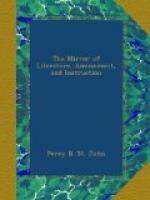“My friends and faithful subjects, both natives and foreigners,—You all know very well that my brother Robert was both called by God, and elected King of Jerusalem, which he now might have happily governed; and how shamefully he refused that rule, for which he justly deserves God’s anger and reproof. You know also, in many other instances, his pride and brutality: because he is a man that delights in war and bloodshed, he is impatient of peace. I know that he thinks you a parcel of contemptible fellows: he calls you a set of gluttons and drunkards, whom he hopes to tread under his feet. I, truly a king, meek, humble, and peaceable, will preserve and cherish you in your ancient liberties, which I have formerly sworn to perform; will hearken to your wise councils with patience; and will govern you justly, after the example of the best of princes. If you desire it, I will strengthen this promise with a written character; and all those laws which the Holy King Edward, by the inspiration of God, so wisely enacted, I will again swear to keep inviolably. If you, my brethren, will stand by me faithfully, we shall easily repulse the strongest efforts the cruelest enemy can make against me and these kingdoms. If I am only supported by the valour of the English nation, all the weak threats of the Normans will no longer seem formidable to me.”
The historian adds, that this harrangue of Henry to his nobles had the desired effect, though he afterwards broke all his promises to them. Duke Robert went back much disgusted; when his brother soon after followed, gained a victory over him, took him prisoner, put out his eyes, and condemned him to perpetual imprisonment.
G.K.
* * * * *
REMEDY FOR ALDERMEN SLEEPING IN CHURCH.
“Sleep no more.”—Macbeth.
Bishop Andrews was applied to for advice by a corpulent alderman of Cambridge, who had been often reproved for sleeping at church, and whose conscience troubled him on this account. Andrews told him it was an ill habit of body, and not of mind, and advised him to eat little at dinner. The alderman tried this expedient, but found it ineffectual. He applied again with great concern to the bishop, who advised him to make a hearty meal, as usual, but to take his full sleep before he went to church. The advice was followed, and the alderman came to St. Mary’s Church, where the preacher was prepared with a sermon against sleeping at church, which was thrown away, for the good alderman looked at the preacher during the whole sermon time, and spoiled the design.
P.T.W.
* * * * *
THE NATURALIST.
THE BARN OWL.
(Concluded from page 28.)




